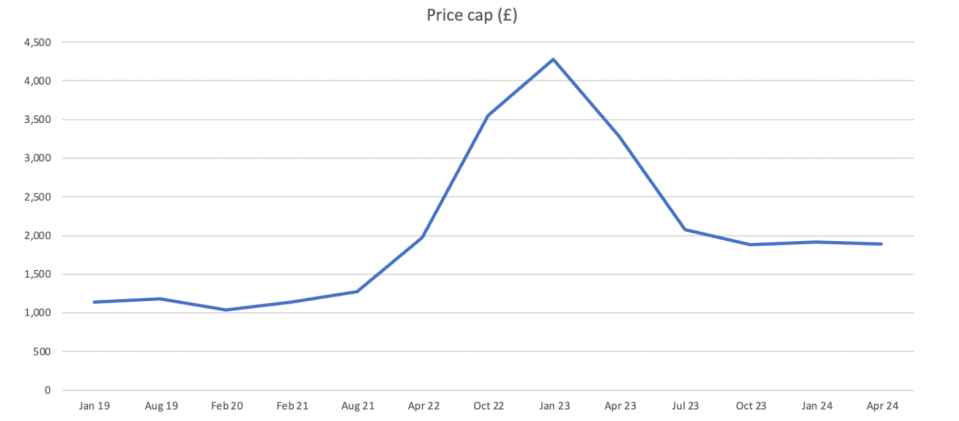Utilita boss: We’ve got ‘no faith’ in Ofgem’s ability to manage the market

The price cap is still “the biggest single risk to supplier profitability,” the boss of Utilita Energy has warned, adding that he still had “no faith” in Ofgem’s oversight of the market.
Bill Bullen, chief executive of Utilita Energy, told City A.M. that increasing regulatory burdens such as the watchdog’s plans to tighten allowances for firms emerging from the energy crisis risked sapping the company’s balance sheet.
Ofgem has written several open letters to suppliers this summer, with Ofgem’s chief executive Jonathan Brearley calling on energy firms to make sure they were financially stable.
The regulator has also revealed plans to review the price cap formula, which includes cutting allowances for suppliers and handing money back to customers.
They have been factored into the price cap to help suppliers claw back funds from establishing hedging for new customers and ensure market stability, which is added onto households’ bills.
But now that gas prices are coming down, the regulator wants to reduce the allowance.
“Jonathan Brearley wrote an open letter two weeks ago where he said basically we’ve not been funding the costs. How can he now be lecturing us all about financial adequacy? He’s the one who’s drained my balance sheet. So it’s absolute nonsense – I have no faith at all [in them],” Bullen said.
He suggested that Ofgem were “just playing with numbers in a spreadsheet,” while also questioning whether Ofgem had sufficient expertise to call on suppliers to be more efficient.
“They don’t really know what an efficient business is, as part of being efficient is being agile and innovative and all of the things they don’t really want you to do because that makes you too different and too difficult to regulate,” the energy boss added.
Bullen has previously criticised the regulator, warning last year he had lost confidence in the supplier after it was criticised by Ofgem in multiple market compliance reviews.
Utilita agreed to pay £830,000 last December after the watchdog determined the supplier was not taking individual circumstances into consideration when deciding whether to provide additional support credits for customers topping up prepayment meters.
Bullen urges more energy support this winter
Bullen has also been urging the government to announce more financial support to help households with energy bills this winter ahead of parliamentary recess, which they have opted against.
Chancellor Jeremy Hunt has not announced any plans to introduce further support for households this winter, but Bullen fears that as many as one in three households still will need financial help with the price cap set to be near double conventional levels over the coming winter.
Bullen was not in favour of reviving the Energy Price Guarantee, which offered subsidised bills to everyone last winter, but called for targeted help for up to 10m households.
Utilita, which is home to 850,000 customers and chiefly operates through prepayment meters, calculates that low-income households will need at least £593 additional government support to stay warm and keep the lights on this winter.
This is based on analysis of smart meter data from more than 50,000 financially vulnerable customers.
The energy boss warned that incomes have not “risen at all anywhere in line with inflation,” with low-income households facing higher prices in food, rent and council tax, meaning they are “disproportionately hit” by the cost of living crisis.

“We are going to see a bigger problem with affordability this winter than we had last year,” he said, referencing conversations the supplier has had with debt charities and reports of rising disconnection rate this summer.
This would cost around £6bn to fund, but he argued this could be supported through scrapping renewable obligation certifications (ROCs) for legacy green energy producers.
The scheme, which has been closed to new producers since 2017, means the government pays a subsidy to generators on top of the current wholesale price.
Low carbon generators with ROCs hugely benefit from the wholesale cost of electricity, currently set by the price of gas, which has been at record levels for the past year.
Bullen said: “We’re still paying the £6bn per year subsidy to renewable generators and that’s in your energy bill. Frankly, redirect that money… for no change in your energy bill, we could provide £600 per household.”
A department for energy security and net zero spokesperson said: “We covered around half a typical household’s energy bill over winter and with costs falling from next month as the new price cap kicks in, the Energy Price Guarantee will remain in place as a safety net through to April 2024 – with additional help targeted at the most vulnerable.
“As set out in the Autumn Statement, we’re working with consumer groups and industry to assess the best long-term approach to helping vulnerable households, as part of wider market reforms.”
A spokesperson for Ofgem said: “The team at Ofgem closely analyse allowances for suppliers to ensure they can recover costs, while protecting customers from excessive costs.”